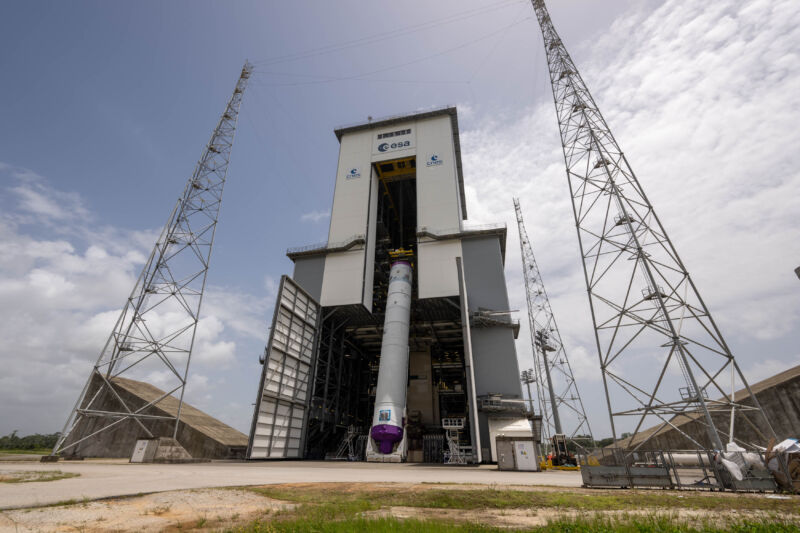
ESA-M. Pédoussaut
In a shocking announcement this week, the European intergovernmental organization responsible for launching and operating the continent’s weather satellites has pulled its next mission off a future launch of Europe’s new Ariane 6 rocket. Instead, the valuable MTG-S1 satellite will now reach geostationary orbit on SpaceX’s Falcon 9 rocket in 2025.
“This decision was driven by exceptional circumstances” said Phil Evans, director general of the organization Eumetsat. “It does not compromise our standard policy of supporting European partners, and we look forward to a successful SpaceX launch for this masterpiece of European technology.”
The decision, taken at a council meeting of Eumetsat’s 30 member nations on Wednesday and Thursday, comes less than two weeks before the debut of the Ariane 6 rocket, scheduled for July 9.
Stabbed in the back
Outwardly, at least, this decision reflects a lack of confidence in the reliability of the Ariane 6 rocket, the ability of European companies ArianeGroup and Arianespace to produce future versions of the Ariane 6, or both. It comes not just on the eve of the long-awaited debut of the Ariane 6, but also at a time when European officials are trying to close ranks and ensure that satellites built in Europe get launched on European rockets.
The retirement of the Ariane 5 rocket last July, and years of delays in the readiness for the Ariane 6 rocket, have led to a painful period in which European officials have had to come hat-in-hand to their longtime competitor and nemesis in the rocket industry, SpaceX, for launch services. As a result some of Europe’s most valuable missions, including the Euclid space telescope and several Galileo satellites, have already launched on the Falcon 9.
This has been embarrassing enough for European launch officials, who effectively created the concept of “commercial” space launch with the first Ariane rockets decades ago. For a long time, they, alongside Russia, were the kings of launching other people’s satellites. But now, on the eve of restoring European access to space, Eumetsat has effectively stabbed this industry in the back.
That is not too strong of language, either. In its release, Eumetsat described its new Meteosat Third Generation-Sounder 1 satellite as a “unique masterpiece of European technology.” The organization added, “This first European sounding satellite in a geostationary orbit will bring a revolution for weather forecasting and climate monitoring in Europe and Africa, and make it possible, for the first time, to observe the full lifecycle of a convective storm from space.” Critically, Eutmetsat was not willing to entrust this spacecraft to Europe’s new flagship rocket.
The chairman and chief executive of the French space agency, CNES, certainly felt the sting, calling the decision a “brutal change” and saying it was a “disappointing day” for European space efforts.
“I am impatiently waiting to understand what reasons could have led Eumetsat to such a decision, at a time where all major European space countries as well as the European Commission are calling for launching European satellites on European launchers!” he wrote on LinkedIn. “Not mentioning the fact that we are 10 days away from the maiden flight of Ariane 6. How far will we, Europeans, go in our naivety?”
Why did they do this?
It is difficult to fully understand the motivations of Eumetsat in this decision. Most probably, there were some timing and reliability concerns. The MTG-S1 satellite was due to launch on the third flight of the Ariane 6 rocket, a mission nominally scheduled for early 2025. On this timeline the satellite very likely would have gotten to space more quickly than it otherwise will now on a Falcon 9.
However, because this 4-ton satellite is going to geostationary orbit, it would have been the first mission to require use of a more powerful version of the Ariane 6 rocket. Instead of using two solid-rocket boosters, this “64” version of the rocket uses four solid-rocket boosters. It seems likely that Eumetsat officials had concerns that the timeline for this launch would drag out, and perhaps some mission assurance concerns about being the first launch of an Ariane 64 rocket.
Whatever their reasons, the European satellite officials have thrown a massive turd into the punchbowl at festivities for the debut of the Ariane 6 rocket.




















+ There are no comments
Add yours